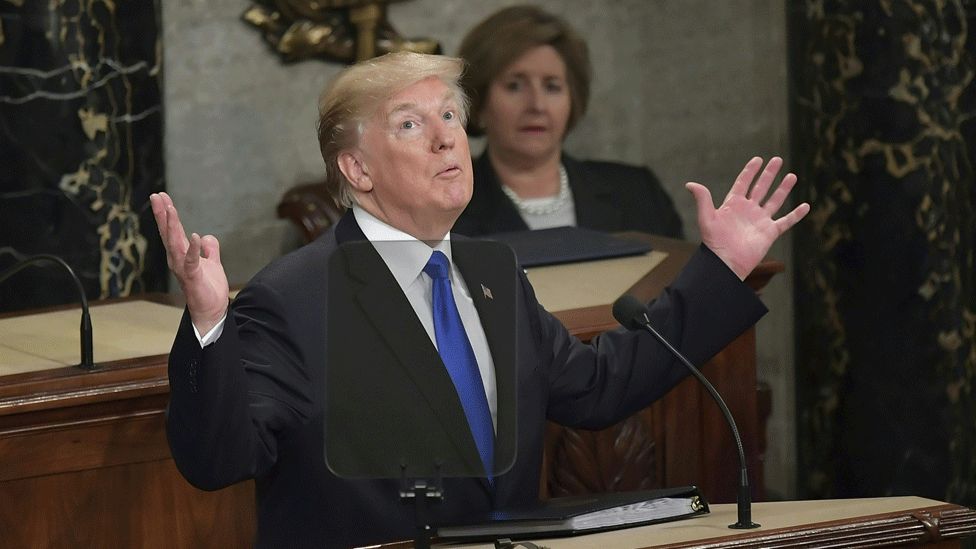Google says Trump's bias claims are 'not true'
- Published

Google has disputed claims from President Donald Trump that it did not promote his State of the Union address.
President Trump posted a video on Twitter he said provided evidence the search giant had not featured his 2017 speech.
In response, Google said this speech had been to Congress and therefore not a State of the Union address.
Google's director of news tweeted that President Trump's claims were "not true".
Allow Twitter content?
This article contains content provided by Twitter. We ask for your permission before anything is loaded, as they may be using cookies and other technologies. You may want to read Twitter’s cookie policy, external and privacy policy, external before accepting. To view this content choose ‘accept and continue’.
The president's tweet, which has been viewed three million times, links to a video featuring a series of screenshots of Google homepages, from January 2012 to February 2018.
A headline reads: "For years Google promoted President Obama's State of the Union on its homepage. When President Trump took office, it stopped."
It is not clear who made the original video or how it was created but the tweet is hashtagged #StoptheBias.
In a statement, Google said: "On 30 January 2018, we highlighted the livestream of President Trump's State of the Union on the google.com homepage."
"We have historically not promoted the first address to Congress by a new president, which is not a State of the Union address. As a result, we didn't include a promotion on google.com for this address in either 2009 or 2017."
Wayback Machine
It is the second time this week that President Trump has accused Google of bias against him. On Tuesday, he said it had rigged search results for the phrase "Trump news" and he threatened greater regulation of the big technology companies.
His latest tweet has been subject to intense scrutiny on Twitter, with some creating their own videos of the relevant pages, using a web archive tool known as the Wayback Machine.
Director of Google's News Lab, Steve Grove, tweeted of the president's claim: "This is not true. See our statement and the proof, here."
Allow Twitter content?
This article contains content provided by Twitter. We ask for your permission before anything is loaded, as they may be using cookies and other technologies. You may want to read Twitter’s cookie policy, external and privacy policy, external before accepting. To view this content choose ‘accept and continue’.
He linked to a Buzzfeed article that pointed out inconsistencies between the screenshots in President Trump's video and those captured from the web archive.
For example, the relevant 2016 page captured using the WayBack Machine features a Cinderella-themed doodle and includes the word "final" in the sentence linking to President Obama's State of the Union speech. Neither of these feature in the video President Trump posted.
Lisa-Maria Neudert, a researcher at the Oxford Internet Institute, said: "Trump again positions himself and his supporters in the role of the unfair disadvantaged, and even victim. After his weaponisation of unfavourable media reporting as fake news, big tech seems next."
Mark Graham, director of the Internet Archive's Wayback Machine provided the BBC with six links.
He said the Google home page captures - recorded at different times of the day - contradicted the President's claims and showed that the search firm had indeed promoted 2018's State of the Union Address.
- Published28 August 2018